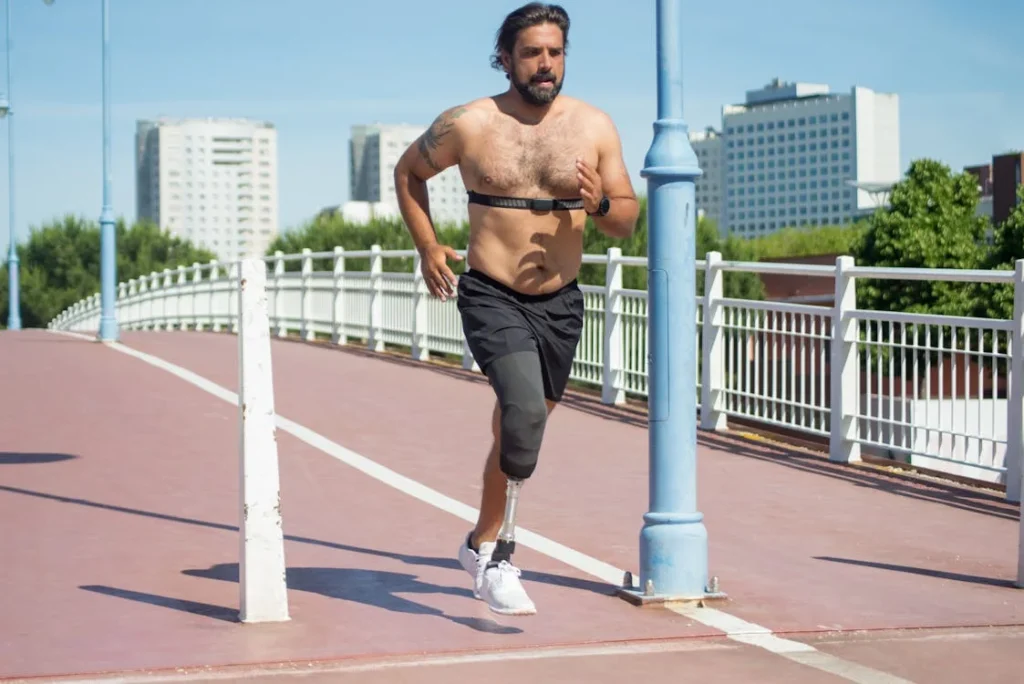When someone loses a limb, the impact is not just physical. Yes, the body changes, but what follows is often deeper and harder to describe — a sense of loss that affects identity, purpose, and confidence. In the past, prosthetics were seen as tools to fix mobility. But today, they are much more than that. They are part of emotional recovery — part of healing a wounded self.
Immediate fit prosthetics, also known as early intervention prosthetics, are designed to be used just days or weeks after an amputation. Unlike traditional prosthetics that require long waits, these are adjustable, modular, and ready to restore a sense of movement and dignity much sooner. But their value is not just functional — it’s emotional.
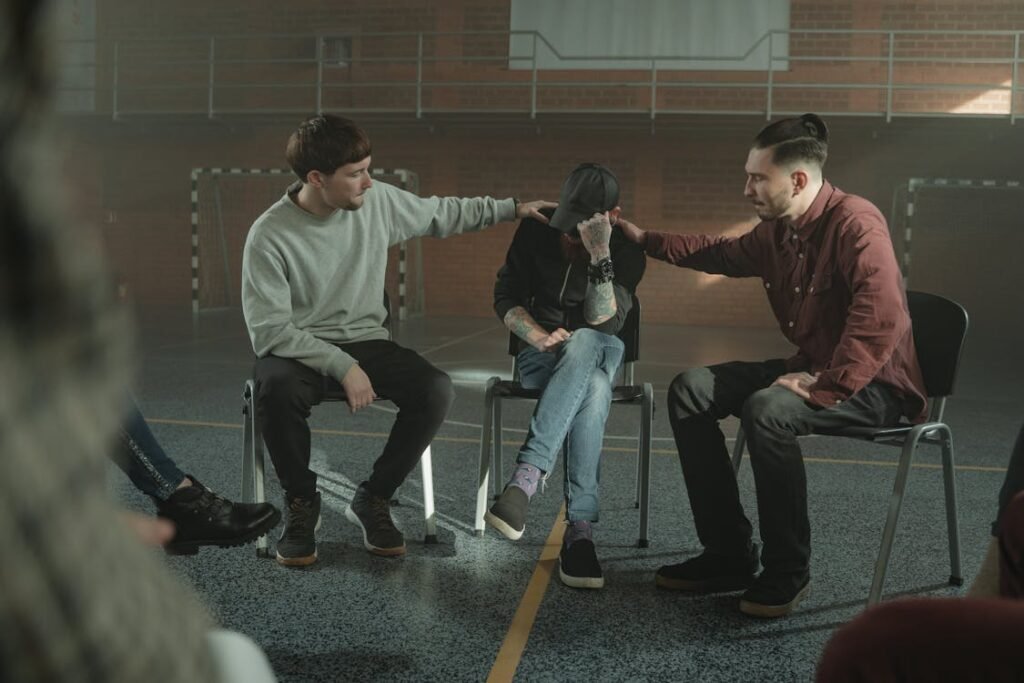
The Emotional Weight of Limb Loss
Understanding the Inner Struggle After Amputation
Losing a limb is a life-changing event, and while the body might be the first focus in treatment, the emotional fallout often runs much deeper. The first few days and weeks post-amputation are filled with fear, confusion, and grief.
People often describe feeling like they’ve lost a part of who they are, not just a body part. The mirror reflects someone unfamiliar. Movement becomes difficult, and everyday activities that once seemed easy now feel like enormous challenges.
The emotional impact varies from person to person. Some may experience severe anxiety about their future, while others fall into depression, especially if their independence is affected.
For many, the loss means the end of a career, a sport they loved, or even a social role they cherished. This creates a psychological void that can’t be filled with medication or physiotherapy alone.
There’s also a profound change in self-image. People may feel ashamed or embarrassed about their appearance. They worry about how others see them, which can lead to isolation.
It’s not uncommon for amputees to withdraw from social situations, avoiding gatherings or even leaving their homes.
This kind of emotional pain is invisible, but very real. The mental scars often take longer to heal than the physical ones. Without the right support, some people may delay or completely avoid rehabilitation, leading to further physical decline and a vicious cycle of hopelessness.
What makes this worse is the waiting. Traditional prosthetic fitting often requires months. During this time, the emotional wounds can grow deeper. The longer a person remains immobile and disconnected, the harder it becomes to mentally and emotionally recover.
Immediate fit prosthetics come into the picture here — not just as a medical device, but as a lifeline. They provide the amputee with a sense of agency, helping them take control of their body and mind during a time when everything feels out of control.
By understanding just how deep the emotional wound of limb loss goes, we can start to see why timing matters so much. The earlier someone begins to walk again, the earlier they begin to believe in themselves again. And that belief can be the most powerful medicine of all.
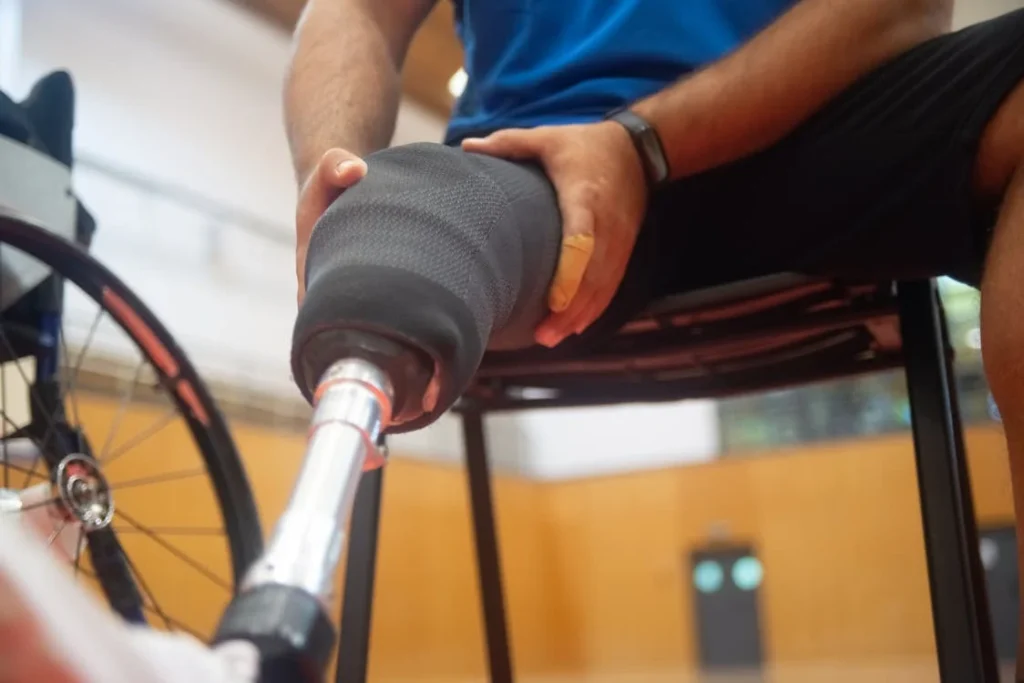
What Are Immediate Fit Prosthetics?
From Functionality to Hope: How Early Prosthetic Use Changes Recovery
Immediate fit prosthetics are designed to be applied shortly after amputation — in some cases, within days or a few weeks.
These prosthetics are modular, adjustable, and temporary, made to adapt to the changing shape of the residual limb during the healing process. But what makes them unique is not just their technical design — it’s their timing.
In traditional rehabilitation, patients often wait for full stump healing, which could take 3 to 6 months or longer. Only then do they begin the prosthetic fitting process, which itself can take weeks.
That long gap between surgery and mobility is filled with immobility, emotional strain, and rising self-doubt.
Immediate fit prosthetics disrupt that timeline entirely. They allow a person to begin using a limb — even if temporarily — almost immediately. The goal is not just physical rehabilitation but emotional momentum.
By standing, walking, or even just sitting with a prosthetic limb in place, patients begin to re-engage with life faster.
Technologically, these prosthetics use softer sockets, adjustable strapping systems, and modular parts that can be replaced or adjusted as the residual limb shrinks or changes.
They are designed to offer safe weight-bearing support and gradual mobility while accommodating swelling or bandaging.
For medical teams, these prosthetics offer another benefit: they allow clinicians to assess gait, comfort, and limb balance much earlier.
That data can be used to craft a more precise, personalized permanent prosthetic later. It also gives therapists a head-start in physiotherapy and gait training.
But from the patient’s perspective, the benefits go beyond utility. What they feel is relief. Relief from helplessness, from waiting, from watching the world move while they stand still.
Immediate fit prosthetics are symbols of hope — and that hope, when offered early, often becomes the emotional foundation of recovery.
This shift — from waiting to walking — isn’t just about speed. It’s about psychology. Early prosthetic use tells the brain, “You’re not broken.” It tells the heart, “You’re still capable.” And that emotional message can change everything.
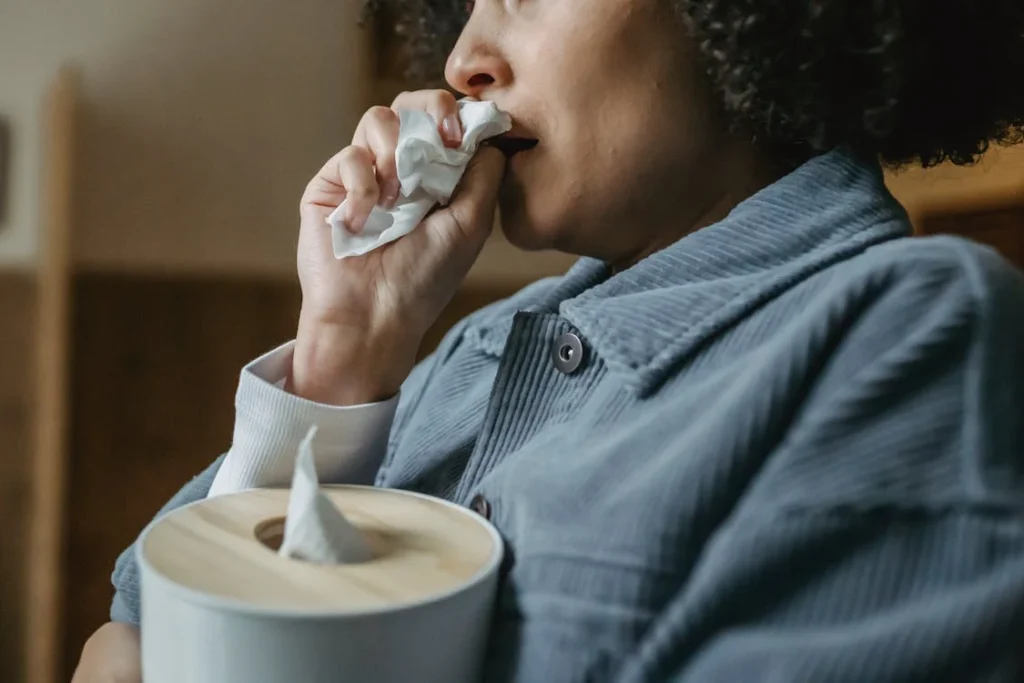
The Link Between Movement and Emotional Recovery
Why Getting Up Early Builds a Stronger Mind
The relationship between physical movement and emotional well-being is deeply rooted in both science and human experience.
When we move, we don’t just exercise muscles — we release hormones, activate brain circuits, and engage with the world around us. For someone recovering from limb loss, this connection becomes even more critical.
One of the most important changes that happen during physical activity is the release of endorphins. These are the body’s natural painkillers and mood boosters.
They help reduce stress, improve sleep, and elevate mood. A person who begins walking again, even with the support of a walker and prosthetic, will naturally feel more emotionally stable. The body’s chemistry starts working in their favor.
But it’s not just about hormones. It’s about mindset. Movement creates momentum. Every step becomes a small win — a sign of progress. This encourages a shift in perspective, from “I’m broken” to “I’m healing.”
That mental transformation is crucial, especially in the early stages when emotional strength is fragile.
Immediate fit prosthetics offer the first opportunity for that movement to begin. Instead of weeks or months of being confined to a bed or wheelchair, the patient starts walking, standing, even doing simple tasks.
These aren’t just movements — they are messages. Messages to the brain that say, “You’re still functional. You’re still in charge.”
This sense of control is huge. One of the biggest emotional challenges after amputation is the feeling of helplessness. When you regain control of your body — even partially — it sparks confidence.
And confidence leads to courage. That courage is what helps someone attend therapy sessions, talk openly with family, and start imagining a future again.
Moreover, movement re-integrates a person into daily life. They can begin grooming themselves, walking short distances, and maybe even doing light household tasks. These small steps help restore normalcy. And normalcy, in times of emotional chaos, is extremely comforting.
All of this adds up to one essential truth: emotional healing and physical movement are deeply linked.
The earlier you begin one, the more you support the other. Immediate fit prosthetics serve as the gateway to that process, offering not just a tool for walking, but a path toward peace of mind.
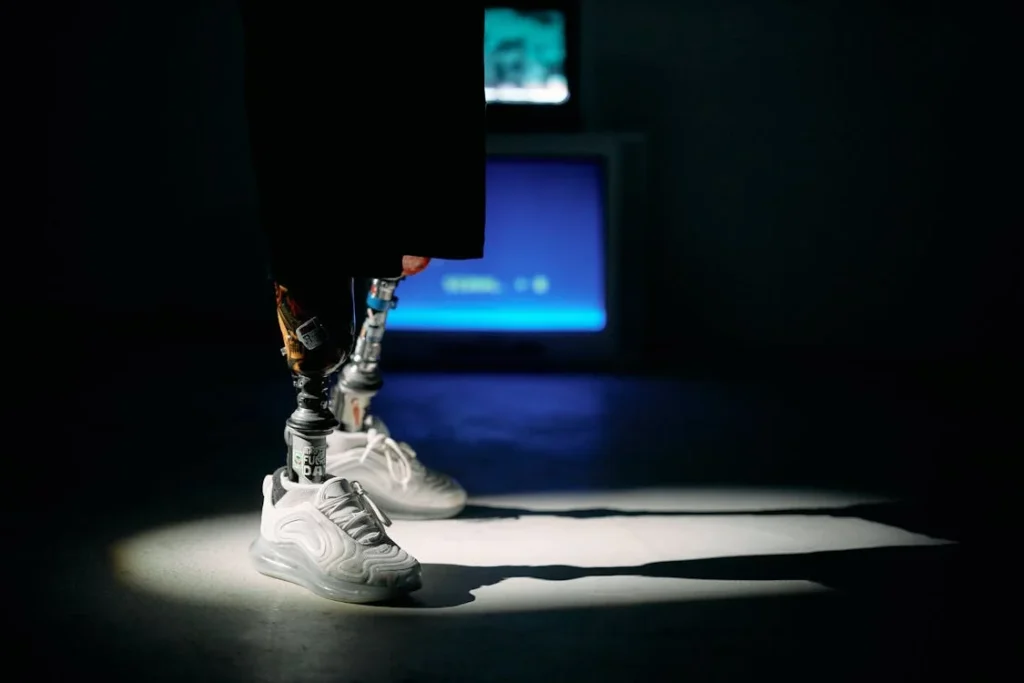
Preserving Body Image and Identity After Amputation
How Immediate Prosthetics Help You See Yourself Again
The moment someone loses a limb, their sense of identity often shifts dramatically. It’s not just the physical absence that creates pain — it’s the way that absence changes how one sees themselves.
Body image is deeply tied to self-worth, dignity, and confidence. For many amputees, looking in the mirror becomes one of the most difficult parts of recovery.
This is where immediate fit prosthetics offer a silent, but powerful form of emotional therapy. By restoring symmetry and visual balance early, they help patients maintain a sense of physical wholeness.
Seeing a limb — even a temporary, adjustable one — helps the mind integrate the new reality more gently. It prevents the prolonged psychological shock of seeing an incomplete body for weeks or months.
Our brains have a built-in map of our body known as the “body schema.” After amputation, this map is disrupted. The longer the disruption continues without adjustment, the more psychological strain it causes.
It’s not uncommon for patients to develop distorted self-images, where the missing limb becomes the focal point of insecurity. This can lead to anxiety, social withdrawal, and even body dysmorphia.
Immediate prosthetics act as a bridge, helping the brain adjust gradually rather than abruptly. They offer visual and functional feedback that supports emotional adaptation.
Instead of waking up each day to an empty space, the patient sees potential. Instead of focusing on what’s gone, they start focusing on what’s still possible.
This visual integration also plays a role in self-esteem. Whether it’s dressing for the day, taking a photo, or simply walking into a room, having a limb in place — even temporarily — boosts confidence.
The person feels less “different” and more “normal.” That sense of normalcy can’t be overstated. It’s often the first step toward emotional acceptance and healing.
And let’s not forget dignity. In many cultures, including ours in India, body appearance carries significant social and emotional weight. Losing a limb can feel like losing a sense of honor, especially for older patients or those in leadership roles.
Immediate prosthetics help restore that dignity early, preventing unnecessary shame or emotional isolation.
Ultimately, identity is a story we tell ourselves — about who we are, how we appear, and how others see us. Immediate fit prosthetics help ensure that this story doesn’t end in loss, but begins again with resilience. They help patients see themselves not as victims, but as survivors in motion.
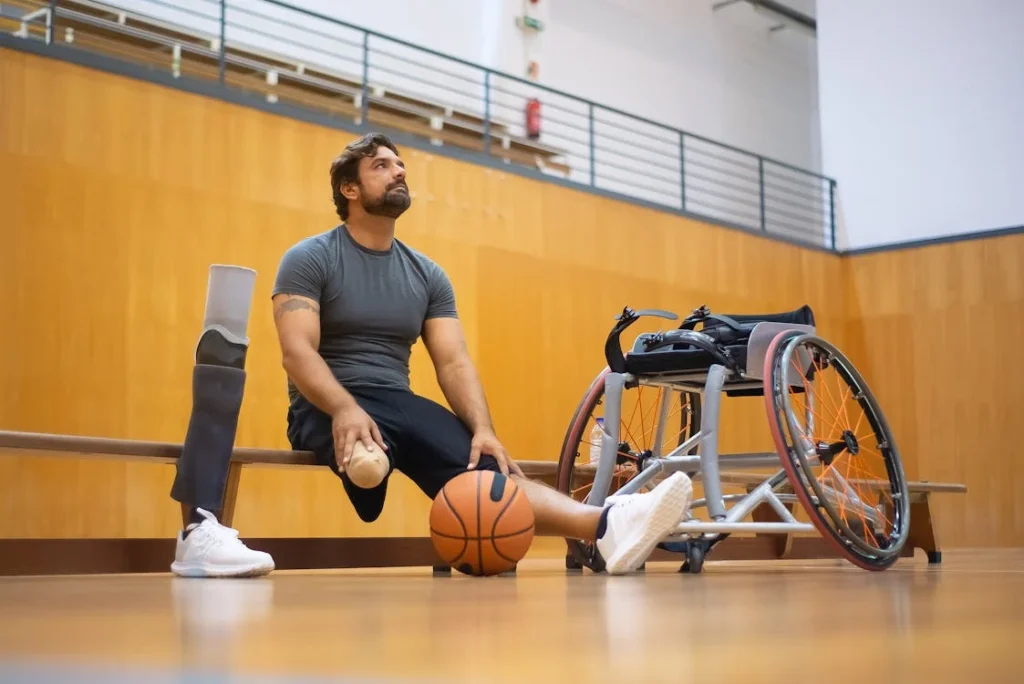
Preventing Emotional Trauma and PTSD
Early Mobility as a Tool Against Long-Term Psychological Damage
Amputation is not just a medical event — it’s a trauma. The sudden loss of a limb, whether due to an accident, illness, or surgical necessity, triggers a cascade of emotional and psychological responses.
Without timely support, many patients are at risk of developing long-term mental health issues, including post-traumatic stress disorder (PTSD).
The early weeks following amputation are the most sensitive. This is the window when memories are fresh, emotions are raw, and fears are intense. If patients are left in a state of helplessness during this period, the trauma often solidifies.
It becomes a narrative of loss, dependency, and fear — rather than a story of recovery and strength.
Immediate fit prosthetics intervene at a critical moment. By enabling physical activity, they disrupt the trauma narrative. They replace passivity with agency.
Instead of lying in a hospital bed, focused on what was lost, the patient is up and moving — focused on what’s next. This shift from fear to action is essential in preventing the emotional imprint of trauma from taking root.
Studies in trauma psychology show that early exposure to positive outcomes can reduce the intensity of post-traumatic symptoms. When patients begin walking or performing basic functions early, their brains associate the event not just with injury, but with progress.
This reduces the mental loops that often lead to PTSD — such as intrusive memories, hypervigilance, or emotional numbness.
Immediate fit prosthetics also play a role in reducing phantom limb pain, which can be both physically and emotionally exhausting. When patients receive tactile and visual feedback from using a prosthetic early, the brain reorients itself, leading to less confusion and fewer pain signals. In turn, this lowers emotional distress.
Another key factor is choice. Trauma often removes a person’s sense of control. Immediate prosthetics return that control — not just over movement, but over the recovery process.
Being able to choose how to sit, stand, or walk again gives the patient a sense of participation in their healing, rather than feeling like a passive subject of surgery and therapy.
It’s important to note that emotional trauma doesn’t only affect individuals. It affects families, relationships, and work environments.
Preventing long-term psychological damage through early intervention doesn’t just save mental health — it restores life pathways that might otherwise be blocked by fear.
Immediate prosthetics, in this context, are more than devices. They’re emotional first-aid. They help break the emotional shock early and build a mindset of resilience that can protect against long-term psychological fallout.
Reintegrating Into Social and Community Life
Moving From Isolation to Inclusion Through Early Mobility
One of the most devastating aspects of limb loss is the sense of social disconnection that often follows. People who once felt confident in public suddenly feel exposed, unsure, or even ashamed.
Many amputees withdraw from social life, avoiding gatherings, celebrations, and even regular conversations. This isolation isn’t just about physical limitations — it’s deeply emotional.
Social reintegration is one of the cornerstones of emotional recovery, and immediate fit prosthetics make that possible much earlier.
When people are able to move, walk, and interact with others — even in a limited capacity — they begin to reclaim their place in the world. That sense of belonging is powerful medicine.
Think of a parent who wants to attend their child’s school event but feels embarrassed by their amputation. Or a worker who wants to return to their job but fears how colleagues will react.
In both cases, a prosthetic restores not just mobility, but confidence. When fitted early, it allows the person to re-engage with their community before social fear takes hold.
Immediate fit prosthetics are designed to be discreet and functional, allowing users to wear regular clothes and appear more “complete” in public settings.
This reduces the stigma and awkwardness that often surround amputations. People don’t stare as much. Conversations become easier. The emotional barrier between “us” and “them” begins to dissolve.
Rejoining social life also boosts emotional resilience. Interactions with others provide emotional support, distraction from pain, and a reminder of identity.
When someone laughs with a friend, shares a story, or simply takes a walk with a neighbor, they feel less alone. That feeling of connection is as important as any medicine.
Community reintegration is also a predictor of long-term success. People who return to work, hobbies, or volunteer activities early tend to recover faster and report higher life satisfaction.
Immediate prosthetics give them a head start. Instead of months of waiting and worrying, they start adapting, engaging, and growing right away.
At Robobionics, we’ve seen firsthand how early prosthetic use transforms not just individuals, but entire families and communities.
We’ve seen patients return to weddings, festivals, and even marathons — not after years, but sometimes just months after surgery. The common thread? Early support, both emotional and functional.
Social reintegration isn’t a luxury. It’s a necessity. Immediate fit prosthetics make it possible when it matters most.
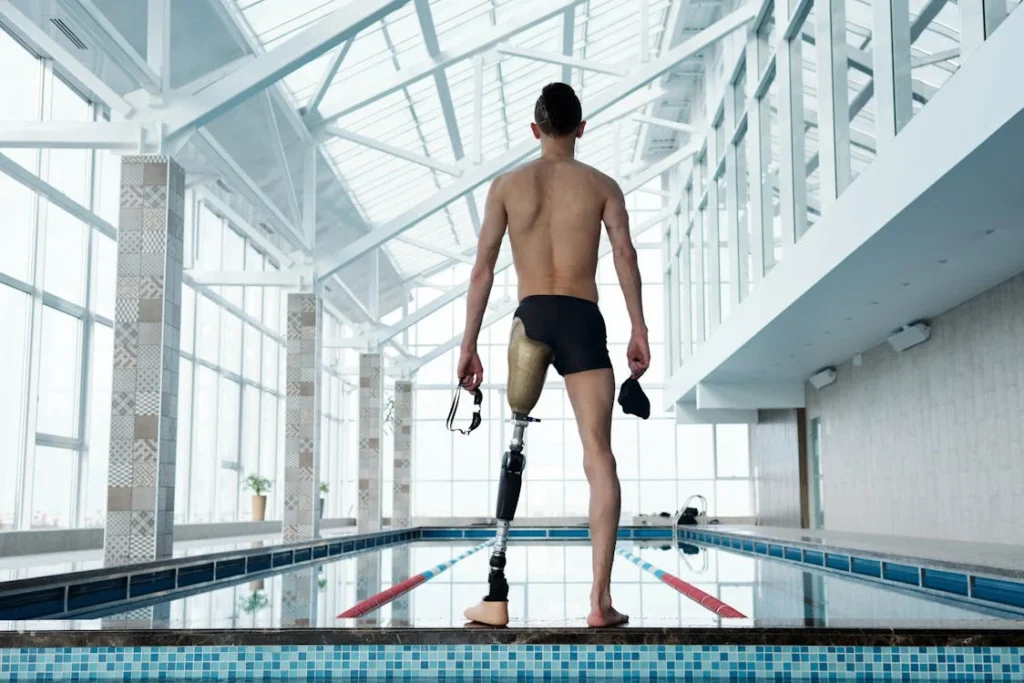
The Role of Family and Caregivers in Emotional Healing
How Early Prosthetic Use Reduces Stress and Inspires Support
When someone experiences limb loss, the emotional strain is not limited to the individual alone. Family members, spouses, and caregivers are often deeply affected.
They witness their loved one’s pain, confusion, and grief — often while struggling with their own fears and responsibilities. The emotional burden on caregivers is real, and if not addressed, it can strain relationships and even delay recovery.
This is where immediate fit prosthetics offer a unique form of relief. By helping the patient regain some level of independence early, they also reduce the pressure on those around them.
Instead of needing full-time assistance for basic movements, the patient can sit up, shift positions, or even walk short distances. These small steps translate into big emotional relief for families.
For caregivers, watching a loved one regain control is empowering. It replaces helplessness with hope. Instead of feeling like they must do everything, caregivers can step back and play a supportive role — helping with rehabilitation, not just survival. This shift improves mental health for everyone involved.
Additionally, early mobility opens the door to communication. Patients who start walking again are more likely to talk, express emotions, and plan for the future.
This creates opportunities for bonding. Instead of painful silence or frustration, families engage in planning, celebrating small victories, and rebuilding routines together.
There’s also a shift in family dynamics. Many amputees worry about becoming a burden. This fear can lead to guilt, depression, and emotional withdrawal.
But when they receive an immediate prosthetic and begin participating in life again, they start to feel useful, included, and respected. That emotional renewal has a ripple effect. Spouses relax, children feel reassured, and siblings or friends step in more openly.
At Robobionics, we’ve seen families reconnect through early prosthetic use. A father walks his daughter to school. A grandmother prepares tea on her own.
A teenager gets up and joins the dinner table. These moments seem small, but emotionally, they are everything. They build resilience not just in the patient, but in the entire support system.
Caregivers also benefit from seeing clear signs of progress. It reduces their emotional fatigue. They feel that their efforts are making a difference — and that the journey ahead, while still challenging, is not hopeless.
In summary, emotional healing is never a solo experience. It’s shared among everyone involved. Immediate fit prosthetics ease that shared burden and replace it with a shared sense of possibility.
That’s how families grow stronger — not just after the wound has healed, but from the moment recovery truly begins.
Long-Term Emotional Benefits of Immediate Fit Prosthetics
Planting Seeds Early for a Resilient Future
While the most visible benefit of immediate fit prosthetics is the early return of mobility, their emotional impact stretches far into the future. What begins as a temporary measure often becomes the emotional bedrock of lifelong recovery.
The early intervention approach doesn’t just accelerate healing — it transforms the entire rehabilitation journey.
One of the most enduring benefits is mindset. People who start walking early tend to develop a forward-looking attitude. They see recovery as an ongoing process rather than a distant goal.
That shift changes how they approach setbacks, pain, and rehabilitation. Instead of fear, they approach challenges with preparation and purpose.
This emotional stability leads to stronger follow-through in therapy and better commitment to long-term goals. Patients who engage early with prosthetic use are more likely to stay active, maintain healthy habits, and return to their personal or professional lives sooner.
These habits, in turn, support mental health, keeping depression and anxiety at bay.
Another long-term benefit is confidence in body image. When patients adjust early to the look and feel of a prosthetic, they carry that comfort with them.
They’re less likely to hide or shy away from public life. This comfort supports dating, friendships, career advancement, and travel — all crucial aspects of a fulfilled life.
Patients also build deeper trust in healthcare and in themselves. Starting the journey with a successful immediate fit experience builds emotional credibility — the belief that “this works” and “I can do it.”
That belief is essential when transitioning to a permanent prosthetic, undergoing complex rehab, or facing new challenges years down the line.
From a psychological standpoint, early mobility also contributes to better emotional regulation. It improves sleep, reduces panic responses, and promotes healthier social interaction. These emotional tools are essential for navigating not just recovery, but life as a whole.
There’s also a community impact. Patients who walk early often become advocates, volunteers, or mentors for others. Their story becomes a source of strength for the next generation of amputees.
They go from being helped to being helpers — and that role reversal is deeply satisfying on an emotional level.
In the long run, what matters most is not just how quickly someone walks again, but how strongly they live afterward. Immediate fit prosthetics plant that seed. They show that healing can begin today, and with the right support, continue for a lifetime.
Conclusion
Amputation is a turning point, but it doesn’t have to be the end of anything. In fact, with the right tools and support, it can be the beginning of something resilient, meaningful, and even beautiful. At Robobionics, we’ve seen this happen — not once, but hundreds of times. And one of the most consistent patterns we observe is this: healing happens faster and deeper when it begins early.
Immediate fit prosthetics are not just devices. They are emotional anchors. They stabilize the person in their most vulnerable moment and offer a path forward — a path filled with small steps that lead to big changes. From improved body image and mental resilience to social reconnection and family harmony, the benefits touch every part of life.
More than anything, these prosthetics offer something essential: hope in action. Not a vague promise of improvement months from now, but real, tangible progress today.
If you or your loved one is facing life after amputation, know that you don’t have to wait in the dark. You can walk toward light — toward confidence, dignity, and strength — starting now.
At Robobionics, we’re here to help you take that first step. Because the journey to emotional well-being doesn’t begin after healing. It begins the moment you believe you can move forward — and we’re ready when you are.



